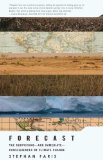Summary | Excerpt | Reviews | Beyond the Book | Readalikes | Genres & Themes | Author Bio
The Consequences of Climate Change, from the Amazon to the Arctic, from Darfur to Napa Valley

Critics' Opinion:
Readers' Opinion:
First Published:
Dec 2008, 256 pages
Paperback:
Sep 2009, 256 pages
 Book Reviewed by:
Book Reviewed by:
Beth Hemke Shapiro
Buy This Book
I first visited the region in the spring of 2004, when I traveled to the town of Adré on the eastern edge of Chad and drove three hours south along the Darfurian border. Refugees had been crossing the dry riverbed that formed the frontier and provided the area with its only source of water. It was early morning when I followed a group of women and their mules down into its dry sands. The rising sun made contrails from the dust at their feet. The vegetation was low and scrubby. The women dug broad holes into the bed of the river and pulled out brownish water with plastic jugs. It was dangerous work. The Janjaweed were still active on the other side and had been watering their horses and camels nearby. While their violence was mostly confined to Darfur, the militia had begun to launch cross-border raids in search of cattle that had escaped their assault.
The women had nearly filled their water barrels when two new arrivals dropped from the brush on the far side and fell to their knees in Muslim prayer. They were both women in their fifties, prematurely wrinkled and bent by sun and poverty. When they rose, I asked one to tell me her story. Halime Hassan Osman and her companion had left Chad the night before, risking discovery to return to Darfur and dig in the ruins of their village. They had spent the day in fear, hiding in the bush, too terrified to eat or pray, and returned after another night of fretful walking. The only thing they had found to salvage was a few handfuls of grains and beans. It had been a rough journey, and it seemed strange to me that these two grandmothers had been chosen for the mission. “If the men go, they will kill them,” Halime answered. “If it’s a young woman, they rape her. That’s why it’s us, the old women, who go see.”
The refugees were camped in the high ground just inside Chad, in makeshift shelters of bent reeds and woven grass among the mud houses of a nearby village. On the wall of the local dispensary, the community’s only concrete building, children had used charcoal to draw crude sketches of men and machine guns and planes dribbling bombs.
A fifty-five-year-old man named Bilal Abdulkarim Ibrahim showed me where he had been shot twice while saving his daughters from being raped. “I said, ‘I will die. I cannot let you rape my girls in front of me.’” His attackers had tied a cord around his testicles and pulled, beating his wife when she tried to cut him loose. He only escaped when an older, white-bearded militiaman ordered his release. Fatum Issac Zakaria, a young girl, was seven months pregnant when she and three others were raped during an attack on her village. “We didn’t want to go with them,” she said. “They beat us all the way into the forest. They said, ‘You are the wives of the rebels.’ They insulted us. They said, ‘You are slaves.’” That night as I was leaving, I saw flames rising from inside Sudan. They glowed for about ten minutes, then faded away. It was the Janjaweed, the refugees told me, torching the last of their homes.
Until the rains began to fail, the sheikh’s people had lived amicably with the settled farmers. The nomads were welcome passers-through, grazing their camels on the rocky hillsides that separated the fertile plots. The farmers would share their wells, and the herders would feed their stock on the leavings from the harvest. But with the drought, the nomads ranged farther for their food, and the farmers began to fence off their land—even fallow land— for fear it would be ruined by passing herds. Sometimes they’d burn the grass upon which the animals fed. A few tribes drifted elsewhere or took up farming, but the camel-herding Arabs stuck to their fraying livelihoods—nomadic herding was central to their cultural identity.
Excerpted from Forecast by Stephan Faris. Copyright © 2009 by Stephan Faris. Excerpted by permission of Macmillan, a division of Henry Holt and Company. All rights reserved. No part of this excerpt may be reproduced or reprinted without permission in writing from the publisher.





The House on Biscayne Bay
by Chanel Cleeton
As death stalks a gothic mansion in Miami, the lives of two women intertwine as the past and present collide.

The Flower Sisters
by Michelle Collins Anderson
From the new Fannie Flagg of the Ozarks, a richly-woven story of family, forgiveness, and reinvention.

The Funeral Cryer by Wenyan Lu
Debut novelist Wenyan Lu brings us this witty yet profound story about one woman's midlife reawakening in contemporary rural China.
Your guide toexceptional books
BookBrowse seeks out and recommends the best in contemporary fiction and nonfiction—books that not only engage and entertain but also deepen our understanding of ourselves and the world around us.